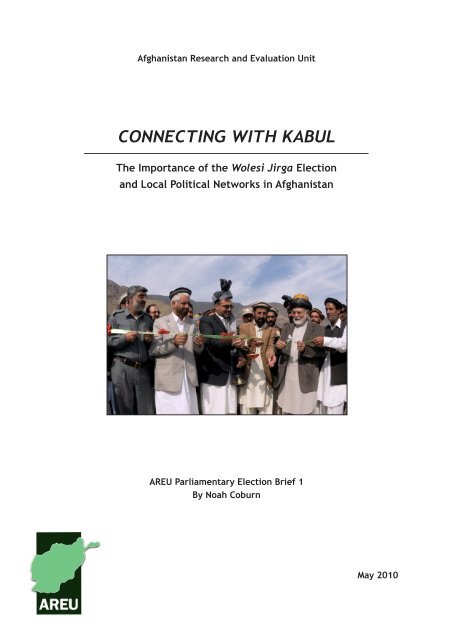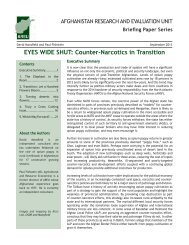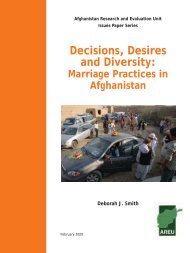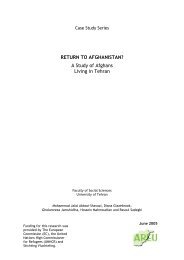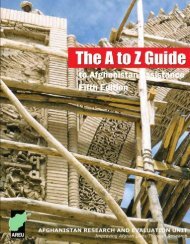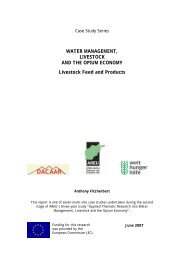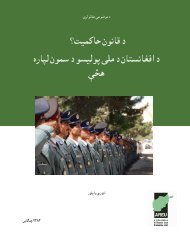connecting with kabul - the Afghanistan Research and Evaluation ...
connecting with kabul - the Afghanistan Research and Evaluation ...
connecting with kabul - the Afghanistan Research and Evaluation ...
Create successful ePaper yourself
Turn your PDF publications into a flip-book with our unique Google optimized e-Paper software.
<strong>Afghanistan</strong> <strong>Research</strong> <strong>and</strong> <strong>Evaluation</strong> UnitConnecting <strong>with</strong> KabulThe Importance of <strong>the</strong> Wolesi Jirga Election<strong>and</strong> Local Political Networks in <strong>Afghanistan</strong>AREU Parliamentary Election Brief 1By Noah CoburnMay 2010
<strong>Afghanistan</strong> <strong>Research</strong> <strong>and</strong> <strong>Evaluation</strong> UnitTable of Contents1. Introduction..................................................................................... 22. Perceptions of Parliament <strong>and</strong> Parliamentarians.......................................... 33. How <strong>the</strong> Local Political L<strong>and</strong>scape Shapes Views about MPs............................ 64. Why <strong>the</strong> Parliamentary Election Matters for Local Communities....................... 85. What this Means for <strong>the</strong> 2010 Election..................................................... 106. Conclusion...................................................................................... 12This study was partially funded by <strong>the</strong> Foundation of <strong>the</strong> Open Society Institute (FOSIA).About <strong>the</strong> author: Noah Coburn is a socio-cultural anthropologist in Kabul <strong>with</strong> <strong>the</strong> UnitedStates Institute of Peace. He received his doctorate from Boston University after researchinglocal political structures, conflict <strong>and</strong> democratisation in <strong>Afghanistan</strong> from 2006-2008. He has aMA from Columbia University in New York.Acknowledgements: The author would like to thank all <strong>the</strong> participants who gave <strong>the</strong>ir time totake part in this study. He is also sincerely grateful to <strong>the</strong> research team of Mohammad HassanWafaey, Farid Ahmad Bayat, Zahir Seddiqqi, <strong>and</strong> Anisa Nuzhat for <strong>the</strong>ir invaluable contributionto this project. Finally, he would like to thank AREU’s Paula Kantor, Anna Larson <strong>and</strong> Jay Lameyfor <strong>the</strong>ir time <strong>and</strong> support in producing this paper.Editing <strong>and</strong> layout by Jay Lamey.Cover Photograph: The ceremonial opening of <strong>the</strong> Khas Kunar Truck Bridge in Kunar Province on5 November 2009. Present are an MP <strong>and</strong> a Senator, as well as a local community representative,<strong>the</strong> provincial governor <strong>and</strong> <strong>the</strong> provincial police chief. Taken by Tech. Sgt. Brian Boisvert of <strong>the</strong>Kunar Provincial Reconstruction Team <strong>and</strong> reproduced under a Creative Commons 2.0 license.© 2010 <strong>Afghanistan</strong> <strong>Research</strong> <strong>and</strong> <strong>Evaluation</strong> Unit. Some rights reserved. This publication maybe reproduced, stored in a retrieval system or transmitted only for non-commercial purposes<strong>and</strong> <strong>with</strong> written credit to AREU <strong>and</strong> <strong>the</strong> author. Where this publication is reproduced, storedor transmitted electronically, a link to AREU’s website (www.areu.org.af) should be provided.Any use of this publication falling outside of <strong>the</strong>se permissions requires prior written permissionof <strong>the</strong> publisher, <strong>the</strong> <strong>Afghanistan</strong> <strong>Research</strong> <strong>and</strong> <strong>Evaluation</strong> Unit. Permission can be sought byemailing areu@areu.org.af or by calling +93 (0)799 608 548.
Connecting <strong>with</strong> Kabul: The Importance of <strong>the</strong> Wolesi Jirga Election <strong>and</strong> Local Political Networks in <strong>Afghanistan</strong>1. IntroductionThere is a renewal of interest in <strong>the</strong> lower house of <strong>Afghanistan</strong>’s parliament, knownas <strong>the</strong> Wolesi Jirga, taking place in both Afghan domestic politics <strong>and</strong> internationaldiscussion about governance in <strong>Afghanistan</strong>. This is particularly in <strong>the</strong> wake of <strong>the</strong> house’srejection of a significant number of ministerial nominees, its opposition to PresidentHamid Karzai’s recent election decree <strong>and</strong> its initial refusal to ratify <strong>the</strong> nationalbudget. With an evolving relationship <strong>with</strong> <strong>the</strong> executive branch, <strong>and</strong> elections currentlyscheduled for 18 September 2010, <strong>the</strong>re are many questions about <strong>the</strong> role of <strong>the</strong> WolesiJirga in national <strong>and</strong> local politics that have not been considered carefully enough. Anddespite widespread concern about fraud <strong>and</strong> corruption during <strong>the</strong> 2009 presidential <strong>and</strong>provincial council elections, <strong>the</strong>re is little consensus on what lessons were learned fromthose elections or what parliamentary elections mean for politics in <strong>Afghanistan</strong>.While <strong>the</strong> international community focuses on procedural aspects of <strong>the</strong> upcoming elections, 1this preliminary study suggests that, on a local level, many Afghans are concerned about howparliamentary elections will play out for very different reasons. In fact, interviewees havetended to de-emphasise <strong>the</strong> role of corruption <strong>and</strong> questions of government legitimacy <strong>and</strong>procedure, which dominate much of <strong>the</strong> current discussion of <strong>the</strong> election in <strong>the</strong> internationalpress. 2 Instead, those questioned tended to focus on <strong>the</strong> role of parliamentarians as importantmembers of local patronage networks who provide some of <strong>the</strong> few real opportunities forcommunities to connect <strong>with</strong> <strong>the</strong> funding opportunities available in Kabul.This paper argues in particular that <strong>the</strong> international community needs to pay moreattention to <strong>the</strong> upcoming parliamentary election—not only for <strong>the</strong> precedents it willset in attempts to promote representational governance in <strong>Afghanistan</strong>, but, morepressingly, because of <strong>the</strong> ability of parliamentary elections to stimulate local politicaldebate <strong>and</strong> reshape local political networks across <strong>Afghanistan</strong> in a meaningful manner.It suggest several broad measures that <strong>the</strong> Afghan government <strong>and</strong> <strong>the</strong> internationalcommunity should take to better concentrate <strong>the</strong>ir efforts to support more active, local<strong>and</strong> democratic political debates.The <strong>Afghanistan</strong> <strong>Research</strong> <strong>and</strong> <strong>Evaluation</strong> Unit (AREU) is conducting ongoing researchon how Afghans in three provinces perceive <strong>and</strong> interact <strong>with</strong> members of parliament(MPs) <strong>and</strong> how MPs are interacting in parliament in <strong>the</strong> run-up to <strong>the</strong> 2010 election. Aspart of this project, this paper focuses only on local perceptions of MPs. It is based onover 100 interviews <strong>and</strong> discussion groups in seven districts in Paktya, Kabul <strong>and</strong> BalkhProvinces. Interviews were conducted across <strong>the</strong>se three provinces, but were focusedon <strong>the</strong> districts of Qara Bagh <strong>and</strong> Istalif in Kabul, Ahmad Abad <strong>and</strong> Gardez in Paktya, <strong>and</strong>Balkh, Dihdadi <strong>and</strong> Kaldar districts in Balkh Province. Interviews were <strong>with</strong> local elders,district-level officials, parliamentary c<strong>and</strong>idates <strong>and</strong> voters, <strong>and</strong> efforts were made toreach all sectors of <strong>the</strong> population, including women. Information was also drawn from53 interviews <strong>with</strong> MPs conducted for a parallel study of internal parliamentary politics.Additionally, it builds on several months of research <strong>and</strong> 200 interviews conducted around<strong>the</strong> presidential <strong>and</strong> provincial council elections in August 2009, which formed ano<strong>the</strong>rcomponent of AREU’s ongoing research into representative governance in <strong>Afghanistan</strong>. 31 Two good examples that include well thought-out recommendations for election reform are DemocracyInternational, “Consensus Recommendations for Electoral Reform in <strong>Afghanistan</strong>” (April 2010) <strong>and</strong> ScottWorden, “Delays Will Not Improve Afghan Elections” (Washington, DC: USIP, February 2010).2 For example, see “United Nations Endorses President’s Choice to Lead Election,” New York Times, 17April 2010, <strong>and</strong> “<strong>Afghanistan</strong> Kicks off Registration for Election,” AFP, 20 April 2010.3 AREU papers on <strong>the</strong> 2009 elections were Noah Coburn <strong>and</strong> Anna Larson, “Patronage, Posturing, Duty,Demographics: Why Afghans Voted in 2009;” Noah Coburn <strong>and</strong> Anna Larson, Voting Toge<strong>the</strong>r: Why <strong>the</strong> Afghan2
Connecting <strong>with</strong> Kabul: The Importance of <strong>the</strong> Wolesi Jirga Election <strong>and</strong> Local Political Networks in <strong>Afghanistan</strong>result is a tendency for interviewees to judge an MP based upon whe<strong>the</strong>r <strong>the</strong>y feel <strong>the</strong>yhave received resources, particularly development projects, through <strong>the</strong>se networks. Ifnot, <strong>the</strong>y were likely to have extremely negative views of <strong>the</strong>ir local parliamentarian. Ifso, <strong>and</strong> this was true in a much lower percentage of cases, <strong>the</strong>y were likely to have anextremely positive view.Thus, responses such as “‘parliament’ is only a word in this country; <strong>the</strong>y are not actuallydoing anything for us,” as one man in Balkh told researchers, were common. Ano<strong>the</strong>rman said: “I have been living here for five years, but have only heard <strong>the</strong> name of <strong>the</strong>representative for parliament. I have never seen what he looks like or what he has donefor this place.” O<strong>the</strong>rs, who felt that MPs were not only ineffective but had stolen fundsmarked for <strong>the</strong>ir areas, made more extreme statements, such as one man who statedthat “MPs only drink <strong>the</strong> blood of <strong>the</strong> people.” This statement was also used in o<strong>the</strong>rinterviews to refer to comm<strong>and</strong>ers who use <strong>the</strong>ir positions for personal gain as opposedto creating opportunities that reach community members more equitably.Interviewees who felt that <strong>the</strong>ir parliamentarian had helped deliver concrete goodstended to echo <strong>the</strong> statement of this woman from Balkh: “Our relationship is verygood <strong>with</strong> our MPs <strong>and</strong> whenever we are faced <strong>with</strong> a problem related to <strong>the</strong>m, <strong>the</strong>yrespond well...[Our MP] made roads, schools <strong>and</strong> literacy courses for women.” Manyof those who spoke positively of <strong>the</strong>ir MPs praised <strong>the</strong> effectiveness of <strong>the</strong> patronagenetwork more than <strong>the</strong> MP <strong>the</strong>mself. For example, as one voter described, “Thereis a good connection between parliament <strong>and</strong> our community because our MP hasalways tried to be like a bridge between people <strong>and</strong> parliament. He is not directly incontact <strong>with</strong> <strong>the</strong> people because he is busy <strong>with</strong> his work in parliament, but peoplecontact him through his bro<strong>the</strong>r because he is <strong>the</strong> head of <strong>the</strong> district shura (council)<strong>and</strong> <strong>the</strong> shura is an organisation that people can contact very easily. People generallygo to <strong>the</strong> shura to transmit <strong>the</strong>ir problems to our MP.” More frequently, however,respondents complained about <strong>the</strong> lack of connection that <strong>the</strong>y had <strong>with</strong> MPs <strong>and</strong>o<strong>the</strong>r local political figures.In addition to bringing resources or benefits back to a community, parliamentarians areoften seen as important for <strong>the</strong>ir ability to link communities to services or influenceavailable in Kabul. While oftentimes much more complicated, respondents oftendescribed <strong>the</strong> process as an ideal type, <strong>with</strong> an individual first approaching his localmalik who <strong>the</strong>n joins <strong>with</strong> o<strong>the</strong>r influential elders to bring <strong>the</strong> problem to <strong>the</strong> MP (or,as <strong>the</strong> case may be, to <strong>the</strong> district governor). Successful MPs provide constituents <strong>with</strong>access to ministers, embassies <strong>and</strong> o<strong>the</strong>r officials. Respondents gave examples of MPssecuring <strong>the</strong>m passports, certificates of refugee status <strong>and</strong> o<strong>the</strong>r government documents,including exemptions from exams from <strong>the</strong> Ministry of Higher Education. This means that<strong>the</strong> ability of an MP to create <strong>the</strong>ir own network among elites in Kabul is particularlyimportant. MPs are clearly aware of this need, as described by one from Balkh: “The MPwho has good networks is more effective than o<strong>the</strong>rs because MPs must meet individually<strong>with</strong> ministers if <strong>the</strong>y wish to solve problems.”Of course, political networks in rural <strong>Afghanistan</strong> are not strictly about resource orservice provision. They are also about social relationships, marriages <strong>and</strong> religiousobligations. Many interviewees interacted <strong>with</strong> <strong>the</strong>ir MPs primarily when <strong>the</strong>y returned to<strong>the</strong>ir homes for social rituals, such as weddings <strong>and</strong> funerals. Some MPs were praised forfulfilling traditional roles, such as holding feasts for <strong>the</strong> community <strong>and</strong> being involvedin local dispute resolution. One MP in Kabul was widely considered an important figurein community-based dispute resolution in his local area. Several respondents discussedhow he was called in after a girl <strong>and</strong> a boy from two different qawms eloped toge<strong>the</strong>r.4
<strong>Afghanistan</strong> <strong>Research</strong> <strong>and</strong> <strong>Evaluation</strong> UnitThe girl’s family were threatening to kill members of <strong>the</strong> boy’s family until <strong>the</strong> MP helda ga<strong>the</strong>ring at which <strong>the</strong> family agreed to compensation instead.This view of MPs as deeply entrenched in local networks contributes to <strong>the</strong> fact that MPsare not discussed by constituents as a part of <strong>the</strong> government, but as a counterbalancinggroup that can sometimes help <strong>the</strong> individual access <strong>the</strong> government. This echoed <strong>the</strong>way that MPs spoke about <strong>the</strong>ir own position vis-à-vis <strong>the</strong> government. 7 Most respondentsused <strong>the</strong> term “government” to refer to <strong>the</strong> executive branch <strong>and</strong> saw parliament asan opposing force to executive power. For those interviewees who tended to oppose<strong>the</strong> government of President Hamid Karzai, parliament provided one of <strong>the</strong> few ways tochallenge <strong>the</strong> status quo. This condemnation was strongest in non-Pashtun areas, butcriticism of <strong>the</strong> national government was still high in all districts where interviews wereconducted. Many Karzai supporters who never<strong>the</strong>less disparaged <strong>the</strong> weakness of <strong>the</strong>central government saw <strong>the</strong> divide between parliament <strong>and</strong> <strong>the</strong> executive as limiting<strong>the</strong> effectiveness of <strong>the</strong> government. A significant number believe that <strong>the</strong> internationalcommunity causes this weakness. One student stated:The government is <strong>the</strong> fa<strong>the</strong>r of a country <strong>and</strong> parliament is a member of thatfamily. Generally, a member of <strong>the</strong> family follows <strong>the</strong> fa<strong>the</strong>r in what he is doing,but actually our fa<strong>the</strong>r is only working for <strong>the</strong> interests of <strong>the</strong> internationalcommunity. This is <strong>the</strong> main reason for <strong>the</strong> gap between parliament <strong>and</strong> <strong>the</strong>government. If <strong>the</strong> government [i.e. <strong>the</strong> executive branch] wants to have agood relationship <strong>with</strong> parliament, first it should act independently [fromforeign influence].Within local communities, voters often directly compare <strong>the</strong> ability of various localfigures to deliver resources, <strong>and</strong> <strong>the</strong> choice of who to turn to in a time of need is animportant political decision at <strong>the</strong> centre of many local debates. In some areas <strong>the</strong>reare clear patterns in who provides which services. In o<strong>the</strong>r cases, however, <strong>the</strong>re is clearcompetition <strong>and</strong> public debate over which local leaders or MPs are most effective atmobilising political capital <strong>and</strong>, for example, contacting NGOs working in <strong>the</strong> area. Oneman from Kabul described his experience: “I called <strong>the</strong> MP, but he did not respond to me,so I decided to take my own path, <strong>the</strong> more effective <strong>and</strong> clear path in our area. I went to<strong>the</strong> qaryadar 8 <strong>and</strong> I was able to solve my problem in this manner.” Ano<strong>the</strong>r man stated:Maliks are more effective than <strong>the</strong> MP from [our district] because maliks areselected from among people, <strong>the</strong>y are always among people <strong>and</strong> <strong>the</strong>y havealways been like a bridge between people <strong>and</strong> <strong>the</strong> district government. Peoplecan contact <strong>the</strong>ir malik more easily than <strong>the</strong>ir MP <strong>and</strong> <strong>the</strong>ir malik alwaystransmits <strong>the</strong>ir problem to district government or any o<strong>the</strong>r organisations.The result is that MPs simultaneously work <strong>with</strong> <strong>and</strong> compete for local influence againstfigures such as comm<strong>and</strong>ers, maliks <strong>and</strong> o<strong>the</strong>r elders. Maliks <strong>and</strong> o<strong>the</strong>r local leaders useMPs for <strong>the</strong>ir ability to tie into national-level patronage networks, while MPs use <strong>the</strong>selocal leaders to mobilise <strong>the</strong>ir political base. The effectiveness (or lack of effectiveness)of MPs <strong>and</strong> o<strong>the</strong>r local political figures creates some of <strong>the</strong> most meaningful local politicaldebates, <strong>with</strong> many respondents eager to compare different figures <strong>and</strong> methods foraccessing <strong>the</strong> national government. These debates are less visible in areas where <strong>the</strong>senetworks are more fixed by <strong>the</strong> strength of tribes or ethnicity-based political parties(such as Paktya <strong>and</strong> Balkh, respectively) than in areas where <strong>the</strong> roles of comm<strong>and</strong>ers,government officials <strong>and</strong> local elders are in more flux <strong>and</strong> locally debated (such as Istalif,Qara Bagh <strong>and</strong> Dasht-i-Barchi in Kabul).7 For more on this see Mohammad Hassan Wafaey’s forthcoming AREU paper on parliamentary dynamicsin <strong>Afghanistan</strong> (due for release in June 2010).8 See Footnote 5.5
Connecting <strong>with</strong> Kabul: The Importance of <strong>the</strong> Wolesi Jirga Election <strong>and</strong> Local Political Networks in <strong>Afghanistan</strong>As <strong>the</strong> election approaches, current MPs <strong>and</strong> potential c<strong>and</strong>idates are working to gainallies in order to secure more votes, while local leaders are attempting to secure asmany resources as possible for <strong>the</strong>ir communities. This is done both through mobilisingvoters <strong>and</strong> using political relations to manipulate <strong>the</strong> vote through fraud. Interestingly,while most respondents complained about fraud nationally, far fewer felt <strong>the</strong>re hadbeen significant fraud in <strong>the</strong>ir area. Fur<strong>the</strong>rmore, instead of delegitimising c<strong>and</strong>idates,in some instances <strong>the</strong> ability to use political connections <strong>with</strong>in <strong>the</strong> Independent ElectionCommission (IEC) in particular was seen as evidence of <strong>the</strong> political strength of <strong>the</strong>c<strong>and</strong>idate, fur<strong>the</strong>r demonstrating why <strong>the</strong>y should represent <strong>the</strong> community.The relationship between MPs <strong>and</strong> local patronage networks raise some interestingquestions about <strong>the</strong> size <strong>and</strong> shape of political communities in <strong>Afghanistan</strong> today. Thereis a tendency to speak of districts as <strong>the</strong> most important local political unit becausemany large-scale development projects are currently being implemented on a districtlevel. Therefore, despite <strong>the</strong> fact that MPs are elected by provincial electorates, manyinterviewees spoke of <strong>the</strong>m as representatives of a specific district. 9 At <strong>the</strong> same time,competing networks of local elders <strong>and</strong> comm<strong>and</strong>ers <strong>with</strong>in a district often supportopposing c<strong>and</strong>idates. This is particularly <strong>the</strong> case in districts more divided along ethniclines (e.g. Qara Bagh in Kabul) or party lines (e.g. many districts in Balkh). For <strong>the</strong> mostpart, interviewees described political communities in <strong>Afghanistan</strong> by <strong>the</strong> reach of aspecific patronage network, or by two or more directly competing networks in <strong>the</strong> caseof more divided areas. At <strong>the</strong> same time, however, networks are constantly reshaping<strong>the</strong>mselves. For example, recent l<strong>and</strong> disputes in Qara Bagh have reshaped many localpolitical relations, while at <strong>the</strong> same time local political leaders have worked in <strong>the</strong> pastdecade to exp<strong>and</strong> <strong>the</strong>ir connections to international NGOs. This means that while thosepeople who consider <strong>the</strong>mselves a certain political community in <strong>Afghanistan</strong> may appearmomentarily stable, in reality <strong>the</strong> evolving political context will affect who considers<strong>the</strong>mselves a part of a certain network at a certain time.3. How <strong>the</strong> Local Political L<strong>and</strong>scape Shapes Views about MPsDespite <strong>the</strong> constant presence of political networks based on both patronage <strong>and</strong>reciprocity, <strong>the</strong>re are clear differences in <strong>the</strong> relationship between MPs <strong>and</strong> constituentsin each of <strong>the</strong> provinces where interviews were conducted, which tend to reflect <strong>the</strong>different forms that political networks can take on in different regions in <strong>Afghanistan</strong>.MPs in Paktya are a part of tribal structures <strong>and</strong> in some ways are extensions of tribalnetworks into <strong>the</strong> central government, at least more so than in o<strong>the</strong>r areas. In Balkh,however, where Governor Atta Mohammed Noor is <strong>the</strong> dominant political force, anMP’s ability to deliver resources is closely tied to that MP’s relationship <strong>with</strong> him. Oneinterviewee said: “These days our environment is controlled by Atta. He is <strong>the</strong> onlyperson. All of <strong>the</strong> MPs are controlled by Atta <strong>and</strong> <strong>the</strong>y have a good relationship <strong>with</strong> eacho<strong>the</strong>r. All of <strong>the</strong> high <strong>and</strong> beautiful buildings that you can see belong to <strong>the</strong>m.” Finally,in Qara Bagh <strong>and</strong> Istalif in Kabul Province, where local warlords continue to play a keyrole in <strong>the</strong> quiet struggle between Tajik <strong>and</strong> Pashtun groups in <strong>the</strong> area, it is <strong>the</strong> MP’sshifting relationships to <strong>the</strong>se comm<strong>and</strong>ers <strong>and</strong> related figures that is often central toshaping <strong>the</strong>ir power.In turn, as might be expected, an individual’s loyalties in an area do much to shapehow <strong>the</strong>y describe <strong>the</strong> politics <strong>with</strong>in <strong>the</strong>ir community <strong>and</strong> judge political leaders <strong>and</strong>9 For more on this see Anna Larson, Toward an Afghan Democracy (Kabul: AREU, 2009) <strong>and</strong> Wafaey’sforthcoming AREU paper on parliamentary dynamics.6
<strong>Afghanistan</strong> <strong>Research</strong> <strong>and</strong> <strong>Evaluation</strong> Unit<strong>the</strong>ir contributions. For example, <strong>the</strong>re has been a recent project in Qara Bagh that hasbrought water through a canal from Charikar, increasing <strong>the</strong> amount of agricultural l<strong>and</strong>in <strong>the</strong> area. The district governor, local MP, local provincial council member <strong>and</strong> severalo<strong>the</strong>r influential elders were all variously involved in negotiating <strong>the</strong> rights to <strong>the</strong> water<strong>with</strong> <strong>the</strong> Charikar community, cleaning <strong>and</strong> rebuilding <strong>the</strong> canal, <strong>and</strong> working to createa system that shared <strong>the</strong> water equitably once it reached Qara Bagh. It seems that <strong>the</strong>MP was primarily responsible for securing funds for <strong>the</strong> project from <strong>the</strong> Ministry ofRural Rehabilitation <strong>and</strong> Development, while <strong>the</strong> provincial council member was key inresolving many of <strong>the</strong> disputes over access to <strong>the</strong> new water. Determining <strong>the</strong> details of<strong>the</strong> process, however, was surprisingly difficult for researchers, <strong>with</strong> many contradictingreports about <strong>the</strong> roles that certain figures had played. In interviews <strong>the</strong>re was a cleartendency to give credit entirely to one figure or <strong>the</strong> o<strong>the</strong>r. As a result, those who favoured<strong>the</strong> MP gave him exclusive credit, while those <strong>with</strong> ties to <strong>the</strong> provincial council membertended to favour him in <strong>the</strong>ir accounts, creating dueling narratives that describe (<strong>and</strong> inmany ways also confer) political authority.It is also clear that <strong>the</strong>se patronage networks are shifting <strong>and</strong> adapting to changingpolitical <strong>and</strong> economic conditions in <strong>the</strong> post-Taliban period. In some areas, figures whohave been able to deliver international aid have grown in stature in comparison tocomm<strong>and</strong>ers who are able to mobilise militias, while in areas <strong>with</strong> more tension, militialeaders have retained a higher degree of <strong>the</strong>ir influence.With <strong>the</strong> approach of <strong>the</strong> second parliamentary election since 2001, MPs will increasinglybe judged on what <strong>the</strong>y have been able to deliver for <strong>the</strong>ir communities. As one voterin Mazar-i-Sharif stated, “Before <strong>the</strong> election we had a good relationship <strong>with</strong> <strong>the</strong> MPc<strong>and</strong>idates, but after <strong>the</strong> election we do not know what <strong>the</strong>y have been doing...I havewitnessed <strong>the</strong>m building modern houses for <strong>the</strong>mselves, but not serving <strong>the</strong> people.”In some instances, MPs <strong>the</strong>mselves are concerned how <strong>the</strong>ir delivery of resources (orfailure to deliver resources) will play out in <strong>the</strong> coming election. One MP from Balkhstated, “Our mistake was making promises to people. Before <strong>the</strong> election I promiseda lot of things to people, but unfortunately we could not implement many of <strong>the</strong>seprograms <strong>and</strong> we have lost <strong>the</strong> trust of <strong>the</strong> people.”In general, however, personal relationships are still <strong>the</strong> most important aspect of localpolitics. Individual ties <strong>with</strong> local elders <strong>and</strong> maliks are often based upon marriage,l<strong>and</strong> use <strong>and</strong> business. As long as <strong>the</strong>se ties continue to have economic <strong>and</strong> politicalimport in <strong>the</strong> daily lives of voters, <strong>the</strong>re is little incentive for <strong>the</strong>se voters to approacho<strong>the</strong>r networks <strong>with</strong> which <strong>the</strong>y do not have such intimate relationships. One businessowner, who is from <strong>the</strong> same qawm as an MP, said “[He] <strong>and</strong> I are good friends <strong>and</strong>were classmates toge<strong>the</strong>r for 12 years, but I must confess that <strong>the</strong>re is no service doneby him in our community,” but later concluded that he was still planning to vote forhim. Responses from interviewees suggest that, in <strong>the</strong> long term, <strong>the</strong>re are possibilitiesfor political shifts as certain networks prove more effective at mobilising an array ofeconomic <strong>and</strong> political resources. As this happens, maliks <strong>and</strong> <strong>the</strong>ir constituents willslowly shift <strong>the</strong>ir group’s support to those networks that appear to be stronger locally.Most interviews suggest that such shifts will be slow, <strong>with</strong> few respondents describingsignificant changes in <strong>the</strong>ir political loyalties over <strong>the</strong> past ten years. Despite this, <strong>the</strong>upcoming elections promise to be an important public test of <strong>the</strong> strength of many of<strong>the</strong>se networks, which is often lacking in muted local political debates.7
Connecting <strong>with</strong> Kabul: The Importance of <strong>the</strong> Wolesi Jirga Election <strong>and</strong> Local Political Networks in <strong>Afghanistan</strong>4. Why <strong>the</strong> Parliamentary Election Matters for Local CommunitiesThe upcoming parliamentary election is important for local politics in <strong>Afghanistan</strong> <strong>and</strong>will continue to set precedents for democratic processes in <strong>Afghanistan</strong>. The vote canserve to solidify processes such as campaigning <strong>and</strong> demonstrate locally <strong>the</strong> power ofpolitical parties, ethnic groups <strong>and</strong> tribes, as similarly occurred during <strong>the</strong> presidential<strong>and</strong> provincial council elections of 2009. 10 Beyond this, however, parliamentary electionscan seriously influence local politics in <strong>Afghanistan</strong> because <strong>the</strong>y represent one of <strong>the</strong>few opportunities for communities to gain or lose representation <strong>with</strong> <strong>the</strong> nationalgovernment <strong>and</strong> international community in Kabul, <strong>and</strong> this has <strong>and</strong> will continue tocreate an opportunity for significant public debate.As <strong>the</strong> 2010 elections approach, it is important to note:• Communities <strong>with</strong> MPs receive more national <strong>and</strong> international supportWhile no conclusive studies have been conducted, <strong>the</strong>re is a clear perception that acommunity <strong>with</strong> a member in parliament is likely to benefit more from both government<strong>and</strong> international funds. Significant anecdotal evidence supports this belief, driving muchof <strong>the</strong> local interest in <strong>the</strong> upcoming elections.• Local struggles will play out publicly in electionsAs a result of <strong>the</strong> perceived benefit of having an MP representing a community, <strong>the</strong>reare remarkably public struggles going on between competing networks of elders <strong>and</strong>comm<strong>and</strong>ers <strong>with</strong>in <strong>and</strong> between communities, even before campaigning has officiallybegun. As in <strong>the</strong> 2009 elections, <strong>the</strong>re is already a good deal of discussion in bazaars,schools <strong>and</strong> o<strong>the</strong>r public spaces, <strong>and</strong> this interest seems strongest in research sites where<strong>the</strong>re is <strong>the</strong> most factionalising <strong>and</strong> tension exists between local groups. This is significantin local Afghan politics, where <strong>the</strong>re is a high premium on secrecy, deception <strong>and</strong> <strong>the</strong> veilingof motives, <strong>and</strong> few public political forums—many respondents expressed <strong>the</strong>ir frustration<strong>with</strong> a political system where many decisions are made during closed door negotiationsbetween people such as <strong>the</strong> district governor <strong>and</strong> a few significant elders. Also, 30 years ofinstability <strong>and</strong> conflict, <strong>the</strong> lack of a serious reconciliation process, <strong>and</strong> <strong>the</strong> current periodof increased stability maintained largely by <strong>the</strong> presence of international troops haveproduced a situation in which tensions between local political groups <strong>and</strong> networks areoften suppressed by <strong>the</strong> fear of intervention by military forces. These elections will givec<strong>and</strong>idates a public forum in which to discuss serious local political issues, which has <strong>the</strong>potential to encourage democratic debate but also to highlight political tensions. LouisDupree described a similar pattern in <strong>the</strong> parliamentary elections of 1965 <strong>and</strong> 1969, whenfeuds intensified as “ethnic groups or factions <strong>with</strong>in groups” brought “<strong>the</strong>ir differences to<strong>the</strong> ballot box.” 11 In several research sites, <strong>the</strong> 2010 election is already generating moreinterest than <strong>the</strong> 2009 elections because <strong>the</strong>ir focus is more local, creating debate onprovincial <strong>and</strong> district issues that have a more significant impact on people’s lives.• C<strong>and</strong>idates are likely to reflect a wider mix of community leaders <strong>and</strong>comm<strong>and</strong>ersInterviews suggest that a wider array of local political figures will run in <strong>the</strong> upcomingelections. There were questions in 2005 about <strong>the</strong> role of <strong>the</strong> Wolesi Jirga <strong>and</strong> how10 See Coburn <strong>and</strong> Larson, Voting Toge<strong>the</strong>r, for a discussion of issues motivating participation <strong>and</strong> politicaldebate in <strong>the</strong> 2009 elections.11 Louis Dupree, “<strong>Afghanistan</strong> Continues its Experiment in Democracy: The Thirteenth Parliament isElected,” American Universities Field Staff, South Asia Series XV, No. 3 (1971), 10.8
<strong>Afghanistan</strong> <strong>Research</strong> <strong>and</strong> <strong>Evaluation</strong> Unitbeneficial a position on it would be for members. Conflict-era comm<strong>and</strong>ers in multipleresearch sites, who potentially had more concerns about prosecution in 2005, have nowdecided to st<strong>and</strong> for election <strong>and</strong> are attempting to use o<strong>the</strong>r economic <strong>and</strong> politicalresources to maintain <strong>the</strong>ir influence. As one voter said, “In <strong>the</strong> past comm<strong>and</strong>ers wereleading people using <strong>the</strong>ir weapons, but now <strong>the</strong>y are leading people by using <strong>the</strong>irpositions in NGOs <strong>and</strong> Afghan organisations.” Similarly, <strong>the</strong>re was an increase in <strong>the</strong>number <strong>and</strong> influence of c<strong>and</strong>idates between <strong>the</strong> parliamentary elections of 1965 <strong>and</strong>1969, as a wider array of local notables joined in <strong>the</strong> process. 12• Elections demonstrate <strong>the</strong> strength <strong>and</strong> honour of certain groupsFor many respondents, successfully electing a c<strong>and</strong>idate to parliament is not simply about<strong>the</strong> material rewards of having a figure in such a position; it is <strong>the</strong> fact that it elevates<strong>the</strong> community in <strong>the</strong> eyes of o<strong>the</strong>rs in <strong>the</strong> area. Indeed, while patronage networks areabout <strong>the</strong> ability to secure certain resources, <strong>the</strong>y are also about maintaining honour<strong>and</strong> a certain status in a community. One of <strong>the</strong> ways that respondents tend to measure<strong>the</strong> strength of <strong>the</strong>ir MPs <strong>and</strong> <strong>the</strong> resulting honour <strong>the</strong>y bring to <strong>the</strong>ir constituents isthrough <strong>the</strong>ir ability to access <strong>the</strong> media. For several voters, an MP’s appearance in <strong>the</strong>media demonstrated <strong>the</strong> political strength of <strong>the</strong> community, <strong>and</strong> a failure to appearin <strong>the</strong> press in turn demonstrated <strong>the</strong> weakness of <strong>the</strong> community. (One Balkh studentlinked media visibility <strong>with</strong> political effectiveness, complaining: “Up to this point, wehave not seen any MP from this area raise <strong>the</strong> problems of <strong>the</strong> people in parliament <strong>and</strong><strong>the</strong>y never talk to <strong>the</strong> people through <strong>the</strong> media.”) These elements of reputation <strong>and</strong>honour will become more acute after <strong>the</strong> election because tallies are released by pollingstation <strong>and</strong> can thus reveal <strong>the</strong> relative strength of local groups, including ethnic groups<strong>and</strong> political parties, shaping <strong>the</strong>ir reputations beyond <strong>the</strong> election period.• Elections create incentives for both increased competition <strong>and</strong> cooperationbetween competing networksStruggles for votes between patronage networks <strong>with</strong>in communities have alreadybegun, often along ethnic or party lines. However, communities as a whole also have anincentive to cooperate <strong>and</strong> attempt to limit <strong>the</strong> number of c<strong>and</strong>idates from that areato not lose <strong>the</strong> opportunity to gain political representation (<strong>the</strong>re is a danger that a“split vote” can remove or dilute a community’s representation). These incentives tocooperate have <strong>the</strong> potential to unite communities. Not all communities, however, willbe able to realise this potential <strong>with</strong> <strong>the</strong> elections publicly revealing hidden fault lines.Communities that are best at balancing <strong>the</strong> interests of local networks <strong>with</strong> <strong>the</strong> need tocooperate will gain <strong>the</strong> most representation in <strong>the</strong> Wolesi Jirga.• Much of <strong>the</strong> local debate revolves around communities attempting to limit <strong>the</strong>number of c<strong>and</strong>idates from one areaThere is a widespread underst<strong>and</strong>ing among interviewees that due to <strong>the</strong> single nontransferablevoting system in <strong>Afghanistan</strong> <strong>the</strong>re is an ideal number of c<strong>and</strong>idates for acertain community that will allow increased representation from that area. This meanscommunities are already discussing ways of limiting <strong>the</strong> number of <strong>the</strong> c<strong>and</strong>idates fromthat area. In previous elections, certain communities were particularly effective atcompromising. As one voter in Balkh said, “We were able to decrease <strong>the</strong> number ofc<strong>and</strong>idates to three since <strong>the</strong>re are three qawms living in <strong>the</strong> area—Hazara, Pashtun <strong>and</strong>Tajik. But only two of <strong>the</strong> c<strong>and</strong>idates won since <strong>the</strong> Hazara qawm is small in this area.”12 Dupree, “<strong>Afghanistan</strong> Continues its Experiment in Democracy,” 8.9
Connecting <strong>with</strong> Kabul: The Importance of <strong>the</strong> Wolesi Jirga Election <strong>and</strong> Local Political Networks in <strong>Afghanistan</strong>• Securing seats in parliament is more important than <strong>the</strong> manner in which thisis doneCommunities have <strong>the</strong> motivation to elect as many representatives as possible to <strong>the</strong>Wolesi Jirga, regardless of how <strong>the</strong>y were elected. In one study district, for example,two people from <strong>the</strong> community won seats on <strong>the</strong> provincial council in 2009. It iswidely believed that one c<strong>and</strong>idate won legitimately, while <strong>the</strong> o<strong>the</strong>r, who had littlepopular support, used corrupt means. Some interviewees acknowledged that <strong>the</strong>re wascorruption locally, which was disagreeable, but were still pleased <strong>with</strong> <strong>the</strong> outcome<strong>and</strong> <strong>the</strong> fact that <strong>the</strong>ir district now had two representatives on <strong>the</strong> provincial council.This pragmatism has created serious ambivalence from respondents about reports ofcorruption <strong>and</strong> fraud at local polling stations. It fur<strong>the</strong>r explains why most intervieweeswere eager to downplay reports of fraud—not only to researchers, but also to electionofficials.5. What this Means for <strong>the</strong> 2010 ElectionWith this knowledge in mind, it now becomes easier to assess <strong>the</strong> importance of <strong>the</strong>political process created by <strong>the</strong> parliamentary election scheduled for September.Notably, most voters interviewed have very different reasons for supporting <strong>the</strong> electionthan those generally offered by concerned international organisations, which suggestssome ways that <strong>the</strong> Afghan government <strong>and</strong> international community can concentrate<strong>the</strong>ir efforts to streng<strong>the</strong>n democratic processes in <strong>Afghanistan</strong>.• The Afghan government <strong>and</strong> international community should increase <strong>the</strong>irfocus on parliamentary elections because <strong>the</strong>y will alter or reinforce localpolitical structuresThe primary reason for most respondents to already be discussing <strong>the</strong> upcoming electionis because it creates a political forum in which a variety of patronage networks <strong>and</strong>political figures in an area can compete for <strong>the</strong> valuable prize of getting better accessto <strong>the</strong> government <strong>and</strong> international community in Kabul. The international communityhas increasingly focused on local governance in <strong>the</strong> past years, <strong>and</strong> <strong>the</strong>se electionsare one of <strong>the</strong> few opportunities for Afghan voters to discuss <strong>and</strong> judge those politicalfigures who are most influential in local politics <strong>and</strong> are key to creating stability on alocal level. Respondents were generally critical of <strong>the</strong> shortcomings of current MPs inlinking local communities to Kabul, but many had opinions on how MPs could betterassist local communities, <strong>and</strong> a transparent election process could promote better localgovernance.• The international community <strong>and</strong> Afghan government should support programsencouraging public political debateJust because many votes follow loyalties to certain political networks <strong>and</strong> groups doesnot mean that <strong>the</strong>re is not a great deal of interest in debating <strong>the</strong> merits of c<strong>and</strong>idates.Moreover, most respondents suggested that voter education was not as important anissue as <strong>the</strong> lack of constructive spaces to carry on political debate. Several respondentscomplained that many of <strong>the</strong> debates over <strong>the</strong> selection of c<strong>and</strong>idates are happening inprivate conversations between key party officials, elders <strong>and</strong> o<strong>the</strong>r influential figures.There is a significant opportunity for civil society groups <strong>and</strong> programs that encourage<strong>the</strong> streng<strong>the</strong>ning of representational democracy in <strong>Afghanistan</strong> to support forums forpeaceful <strong>and</strong> public dialogue.10
<strong>Afghanistan</strong> <strong>Research</strong> <strong>and</strong> <strong>Evaluation</strong> Unit• Fraud <strong>and</strong> corruption are likely to increase <strong>and</strong> will be increasingly difficult tomonitor, <strong>and</strong> monitoring should focus on <strong>the</strong> local levelImproving on <strong>the</strong> 2009 elections by increasing transparency <strong>and</strong> reducing fraud<strong>and</strong> corruption would require <strong>the</strong> Afghan government, <strong>the</strong> IEC <strong>and</strong> <strong>the</strong> internationalcommunity to make a commitment to reforming <strong>the</strong> electoral process; this is somethingmost voters believe is unlikely to happen, meaning most have resigned <strong>the</strong>mselvesto <strong>the</strong> likelihood of ano<strong>the</strong>r election <strong>with</strong> serious corruption <strong>and</strong> fraud. The fact thatc<strong>and</strong>idates also believe such corruption is likely only increases <strong>the</strong>ir incentive to preparefor <strong>and</strong> participate in such fraud <strong>the</strong>mselves. The combination of local networks <strong>and</strong>local concerns suggests that instances of fraud will increase from <strong>the</strong> presidential <strong>and</strong>provincial council elections. This will make monitoring even more challenging <strong>and</strong> means<strong>the</strong>re needs to be an increased focus on local-level monitoring at polling stations.• While reforms are necessary, corruption <strong>and</strong> fraud are not likely to fur<strong>the</strong>rdelegitimise <strong>the</strong> electoral processWhile most respondents suggested that fraud <strong>and</strong> corruption will increase in <strong>the</strong> comingelection, few respondents expected <strong>the</strong> 2010 election to be transparent anyway. A fewvoters mildly chastised local provincial council c<strong>and</strong>idates accused of fraud for actingdishonourably, but <strong>the</strong> majority were more concerned <strong>with</strong> securing more positions on<strong>the</strong> council for <strong>the</strong>ir community. In fact, in a patronage-based political system, influencecomes from <strong>the</strong> perceived ability to mobilise political resources, whe<strong>the</strong>r or not it is donelegally. As a result, <strong>the</strong> ability to influence IEC members <strong>and</strong> increase vote totals, legallyor illegally, is viewed as demonstrating <strong>the</strong> power of a c<strong>and</strong>idate. While efforts should bemade to reform <strong>the</strong> current system, <strong>the</strong>re also needs to be an underst<strong>and</strong>ing that this isa long-term process, <strong>and</strong> <strong>the</strong> more invested voters become in transparent local debates,<strong>the</strong> more likely <strong>the</strong>y are to report <strong>and</strong> act against local instances of fraud.• Failure to follow constitutional procedures has had a limited impact onopinionRespondents were even less concerned <strong>with</strong> <strong>the</strong> following of strict constitutionalprocedures than <strong>the</strong>y were <strong>with</strong> transparency <strong>and</strong> potential fraud. Since elections arestill not yet part of a predictable democratic system in <strong>Afghanistan</strong>, most respondentswere indifferent to any potential fur<strong>the</strong>r delays of <strong>the</strong> election (so long as <strong>the</strong>se delaysare not perceived as indefinite). Given <strong>the</strong> international community’s concern about<strong>the</strong> lack of transparency <strong>and</strong> fraud in <strong>the</strong> 2009, this implies <strong>the</strong>re is more benefit for<strong>the</strong> long-term future of representational governance in <strong>Afghanistan</strong> if all parties make aserious commitment to reforming <strong>the</strong> system <strong>and</strong> <strong>the</strong> election is <strong>the</strong>n delayed. Withoutsuch a commitment, however, <strong>the</strong>re is little to be gained by postponing elections.• The work of <strong>the</strong> international community in supporting this election needs tobe as transparent as possibleThe perceived role of <strong>the</strong> international community in <strong>the</strong> upcoming election willcontinue to shape local opinions about <strong>the</strong> international presence in <strong>Afghanistan</strong>. Manyrespondents are already sceptical of <strong>the</strong> role of <strong>the</strong> international community in <strong>the</strong>2009 elections 13 <strong>and</strong> are suspicious of attempts to manipulate <strong>the</strong> national government.Even if international involvement is minimal, interviews suggest that <strong>the</strong> internationalcommunity will still receive much of <strong>the</strong> blame for corruption <strong>and</strong> o<strong>the</strong>r irregularities,fur<strong>the</strong>r damaging its reputation in <strong>the</strong> country. Moreover, attempts to reform <strong>the</strong> electoralprocess through behind-<strong>the</strong>-scenes negotiations <strong>with</strong> President Karzai have been used asevidence that <strong>the</strong> international community’s involvement in elections are an attempt to13 See Coburn, “Losing Legitimacy?”11
Connecting <strong>with</strong> Kabul: The Importance of <strong>the</strong> Wolesi Jirga Election <strong>and</strong> Local Political Networks in <strong>Afghanistan</strong>manipulate <strong>the</strong> national government. International actors should particularly focus onprograms that encourage local democratic forums <strong>and</strong> oversight.6. ConclusionThe upcoming Wolesi Jirga election promises to be a very public test of many localpolitical figures <strong>and</strong> networks, as well as international attempts to support democraticprocesses in <strong>Afghanistan</strong>. This creates numerous dangers, such as <strong>the</strong> resurrecting of oldfeuds between political networks, <strong>the</strong> potential for violence (as seen in <strong>the</strong> assassinationsof several provincial council c<strong>and</strong>idates last year) <strong>and</strong> <strong>the</strong> potential for objectionablefigures to gain political strength through corrupt means during <strong>the</strong> electoral process.However, <strong>the</strong> 2010 parliamentary election also has <strong>the</strong> potential to create a rare publicspace for Afghans to debate <strong>and</strong> ultimately pass judgment on <strong>the</strong> political networks thatcontinue to shape <strong>the</strong>ir political lives—<strong>and</strong> <strong>with</strong> which many are very dissatisfied. Theimportance of this potential should not be overlooked because <strong>the</strong> election will shapelocal politics in <strong>Afghanistan</strong> in years to come. If capitalised upon, it will provide anopportunity for Afghans to renegotiate <strong>the</strong>ir relationships <strong>with</strong> powerholders in a waythat that ultimately benefits <strong>the</strong>mselves <strong>and</strong> encourages a more democratic future.The <strong>Afghanistan</strong> <strong>Research</strong> <strong>and</strong> <strong>Evaluation</strong> Unit (AREU) is an independent research institute basedin Kabul. AREU’s mission is to inform <strong>and</strong> influence policy <strong>and</strong> practice through conductinghigh-quality, policy-relevant research <strong>and</strong> actively disseminating <strong>the</strong> results, <strong>and</strong> to promotea culture of research <strong>and</strong> learning. To achieve its mission AREU engages <strong>with</strong> policymakers,civil society, researchers <strong>and</strong> students to promote <strong>the</strong>ir use of AREU’s research <strong>and</strong> its library,to streng<strong>the</strong>n <strong>the</strong>ir research capacity, <strong>and</strong> to create opportunities for analysis, reflection <strong>and</strong>debate.AREU was established in 2002 by <strong>the</strong> assistance community working in <strong>Afghanistan</strong> <strong>and</strong> has aboard of directors <strong>with</strong> representation from donors, <strong>the</strong> United Nations <strong>and</strong> o<strong>the</strong>r multilateralagencies, <strong>and</strong> non-governmental organisations. AREU currently receives core funds from <strong>the</strong>governments of Finl<strong>and</strong>, Norway, Sweden, Switzerl<strong>and</strong> <strong>and</strong> <strong>the</strong> United Kingdom. Specificprojects have been funded by <strong>the</strong> Foundation of <strong>the</strong> Open Society Institute <strong>Afghanistan</strong>(FOSIA), <strong>the</strong> Asia Foundation (TAF), <strong>the</strong> European Commission (EC), <strong>the</strong> United Nations HighCommissioner for Refugees (UNHCR), <strong>the</strong> United Nations Children’s Fund (UNICEF), <strong>the</strong> UnitedNations Development Fund for Women (UNIFEM) <strong>and</strong> <strong>the</strong> World Bank.Flower Street (Corner of Street 2), Shahr-i-Naw, KabulTel: +93 (0)799 608 548 / www.areu.org.af / areu@areu.org.af12


